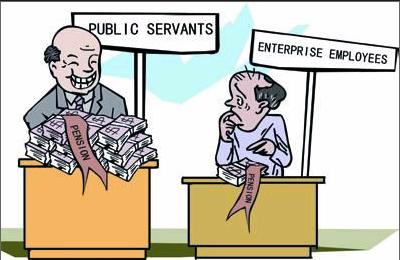Is It Time to Reform the Dual-Track Pension System?
2014-03-18

Civil servants pensions is an issue that has long been debated in China. In spite of the fact that pensions for enterprise employees have been rising continuously for the past seven years, their benefits are much lower than that of their civil servant peers. There exists an increasingly widening gap between civil servants pensions and those of other workers.
Recently, the microblog account of the newspaper Peoples Daily published an article, which says that civil servants pensions surpass those of enterprise employees in many countries around the world. The article cited examples in Germany, the United States and Japan. It stirred up a strong reaction from readers, with many expressing their dissatisfaction with Chinas existing dual-track pension system. The following are excerpts of the opinions:
Tangjiweide (www.eastday.com): Chinas dual-track pension system has led to income gaps between civil servants and enterprise employees. Meanwhile, one thing that is often neglected is that income gaps between civil servants themselves also exist. Officials have higher incomes than those working at a community level, and civil servants in different jobs and regions also have different salaries.
Recently, many community-level civil servants have made their incomes public on the Internet, which shows that most of them do not enjoy the high salaries others have assumed they do. Generally speaking, those who can pass the civil servant examination tend to have a good education background, which is equal to a huge investment in their own education. Therefore, it seems unfair to pay them pensions at the same level as ordinary workers, most of whom didnt need to invest as much in their education.
Civil servants working at the communitylevel have a relatively low salary. Compared to staff at enterprises, most civil servants are paid less. However, the situation will change when they retire. The high pensions enjoyed by civil servants tend to be blamed for social inequality. Nevertheless, civil servants also feel unsatis- fied. They argue that people focus too much on their relatively high pensions, but choose to neglect the high payments received by managerial personnel and technical workers in both state-owned or private enterprises.
Some civil servants at the community level might even feel angry, as they have to deal with the most trivial yet heavy work, even though they are often paid the least in the whole civil servant team. As for these people, it is proper to offer them a high pension. What society feels unhappy about may be the government officials in possession of important resources and power, but who contribute little to society and are also guilty of engaging in corruption. Peoples anger at civil servants high pensions mainly targets these officials.endprint
